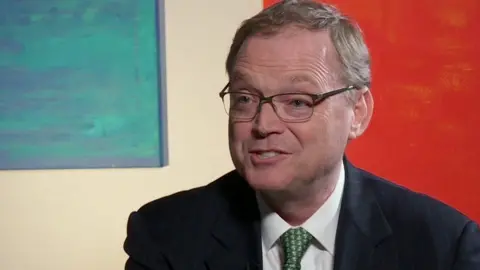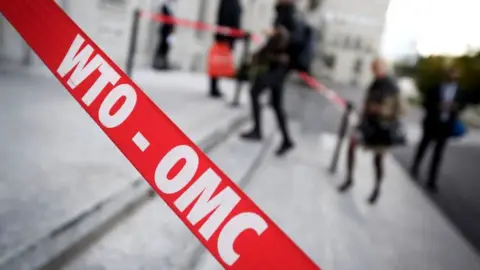US adviser hints at evicting China from WTO
 BBC
BBCOne of President Trump's top economic advisers has suggested there could be a case for "evicting China" from the World Trade Organisation (WTO).
In a BBC interview, Kevin Hassett chairman of the president's Council of Economic Advisers said China had "misbehaved" as a member of the WTO.
He also claimed that the US had been failed by the organisation.
But Mr Hassett said that what he called the President's hardball strategy on international trade is working.
On the WTO, President Trump's administration has taken an approach that many others see as disruptive.
It poses a significant challenge to the WTO's ability to settle disputes between member countries about alleged breaches of its rules.

What is the WTO?
- The World Trade Organization was established in 1995, when it took over from the General Agreement on Tariffs and Trade (Gatt), which came into force in 1948
- Based in Geneva, it has 164 members which it says represents 98% of world trade
- It deals with the rules of trade between nations and its purpose is to promote international commerce
- WTO agreements are lengthy but aim to stop countries discriminating against each other
- It aims to reduce barriers to free trade such as tariffs or quotas
- Countries can also use the WTO to handle trade disputes

A key element in the WTO disputes system is a body which considers appeals against initial rulings by dispute panels. The US has obstructed new appointments when members' terms expire and that is making it increasingly difficult for the body to function.
Damage
Dr Hassett said the WTO played a very important historic role in helping modernise the world. But he also thought that it had failed the US in many ways.
He said the US generally wins the cases it brings to the WTO but "it takes five or six years and then the damage is done".
He said the WTO needs to be better able to deal with countries that don't obey the rules and are willing to lose at the WTO because the penalties are so low.
 AFP/Getty
AFP/GettyOne country has featured prominently in President Trump's trade agenda, and Kevin Hassett continued with that theme: "We never really envisioned that a country would enter the WTO and then behave the way that China has. It's a new thing for the WTO to have a member that is misbehaving so much."
Removing China
The question he argued is whether that can fixed through bilateral negotiation, by reform of the WTO or even, by removing China from the WTO.
The last of those is a not official US policy. It was the final, least preferred, of three options that Dr Hassett listed and he expressed it as a question: "Should we pursue evicting China from the WTO?"
It might not even be possible. But it is a startling suggestion to hear from a senior figure in the US administration.
It is certainly in keeping with a general approach to international trade has been much more assertive- many say confrontational - than that of President Trump's predecessors.
Protectionism
In his first two years he has imposed tariffs - import taxes - on steel and aluminium and on a swathe of goods from China. He pulled the US out of one trade agreement, the Transpacific Partnership, and embarked on the renegotiation of another, the North American Free Trade Agreement, (NAFTA), which concluded earlier this year.
Many of President Trump's critics see much of this as protectionism.
But Dr Hassett says that President Trump wants to see barrier-free trade with every country on earth.
Hardball
When he took office, the US had opened up to other countries "no questions asked". The US, he said, found itself in a situation where it has lower barriers to trade than its partners.
He said Presidents Clinton, Obama and the two Bushes had all wanted to improve that situation and had failed.
 Getty Images
Getty ImagesPresident Trump came into the White House with what Dr Hassett called a very hardball strategy, but he said "I think it is clearly working".
He pointed to the replacement for NAFTA and said the US is in negotiations with virtually all its trading partners now. "That's an enormous amount of progress".
He didn't accept the idea that the new tariffs are bad for Americans. Another former economic adviser to President Trump, Gary Cohn, has described them as a tax on consumers
Dr Hassett said that on China specifically the tariffs have been designed to cause minimum harm at home and put maximum pressure on China.
He said that has been very effective and the Chinese are now coming to the table. He said he was very hopeful that President Trump and President Xi would have productive talks when they meet at the forthcoming G20 summit.
